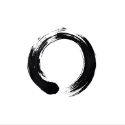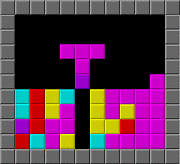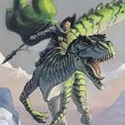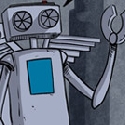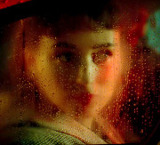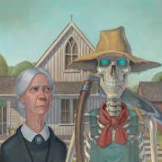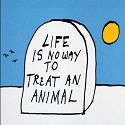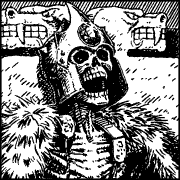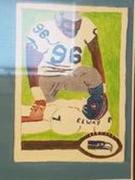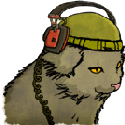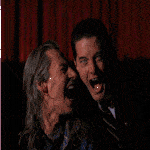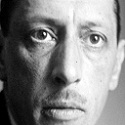|
Mr. Squishy posted:1 The Devils by Fyodor Dostoyevsky as translated by David Magarshack. 51 Confessions of Felix Krull, Confidence Man by Thomas Mann, as translated by Denver Lindley. The first Mann I've read, and another incomplete story. I've not looked into it so it might be designed that way but I suspect that he just died before he could finish it. In the first half it mostly plays on the irony of giving us the self-justifying and -congratulating memoirs of a thief and a lier, but later on that falls away as it really seems that he does do no harm, and it becomes more an ethical meditation and also an exploration of doubleness. The writing is always entertaining, but sometimes it feels that Mann is just showing off his research. 52 The Wapshot Chronicle by John Cheever. This was alright, I guess. Fairly breezy. It's interseting how it seems to mostly explore feminine selfishness. 53 New Grub Street by George Gissing. I really enjoyed this one. A book about the business of writing, and how there's no money in it. It's constant refrain of the importance of wealth reminded me a lot of Orwell's Keep the Aspidistra Flying, although here it is both a lot subtler and also more nihilistic. 54 Adeline Mowbray by Amelia Opie. A fictionalized telling of the unmarried relationship of Mary Wollstonecroft and William Goodwin, and how bloody difficult is was the be an unmarried woman in the early 19th century. The descriptions of men's insulting and threatening behaviour is actually fairly scary. Didactic on the surface (the heroine recants her past behaviour on her deathbed) it handles the issue incredibly well. 55 The Beginning of Spring by Penelope Fitzgerald. I don't really see the point of this book. It's a small novella set in pre-revolution Russia written by an English woman in the 1990s. The setting has been so written a lot of the book feels like an echo of the various actual Russians. The vague storyline just seems to be about how confusing life can be. Possibly the setting was picked because Fitzgerald really wanted to use unsealing the windows for spring as a metaphor for love in later life. Maybe if it was a bit longer and more of the characters felt fleshed out. 56 Plagiarism and Originality by Alexander Lindey. Continuing my slow tour through the source books of William Gaddis. You can see a few of the anecdotes in The Recognitions but A Frolic of His Own is the one that is in real debt. The panicked, irrational plagiarism suit detailed in that novel is taken straight from Lindey's description of various cases. As for the book itself, it's very entertaining, which never uses 1 anecdote to illustrate a point when 10 could do. It's accessible enough that I feel that I understand plagiarism law. Of course, I imagine it's severly out of date, though I only noticed when he was talking about the length of time a work can be copyrighted for. 57 Sketches from a Hunter's Album by Ivan Turgenev as translated by Richard Freeborn. Enjoyable collection of stories, a highlight being the pathetic descriptions of landscape. Apparently what differentiates a sketch from a short story is that the former doesn't need to have an end. The translation is fairly annoying. The serfs are given the accents of various British counties, and a dwarfish holy man is distinctly Irish. Also this translation overuses "literally", though that might be Turgenev's fault. 58 Love in a Cold Climate by Nancy Mitford. Accompanied by a ludicrously anachronistic introduction which insists that, although at first glance a lightweight summer read, it is a serious exploration of mortality, love and Britishness, and if you can't see that then you must be an oik fighting the class war. I guess I can see his point, but I just don't find the majority of the book funny (though I did enjoy whenever the Radletts showed up). The most striking thing for me is that there's a full-fledged peadophile on the loose who everyone just views as a bit of a joke. Times change, I guess. It's so loosely structured that I actually found it difficult to guess the plot. 59 Mario and the Magician and Other Stories (A Man and his Dog, Disorder and Early Sorrow, The Transposed Heads, The Tables of Law The Black Swan by Thomas Mann as translated by H.T. Lowe-Porter. The second Mann I've ever read. He can waffle on a bit, can't he? The Transposed Heads is odd: a hundred digested ethnological reports dressing up a dirty joke. My favourite of all is The Black Swann, where a post-menopausal woman finds love again as told through 5 or so super-long discussions with her nerd daughter. 60 Saint Joan by George Bernard Shaw. Shaw is obviously not the playwright for me. I just found this impossibly smug and stagey, I couldn't even appreciate the use of St. Joan to talk about the arrangement between god and man. 61 One Day More by Joseph Conrad. A not great play but I liked it a great deal more than the Shaw. A young woman tends to the need of two demented old men, ignores the fresh breeze of a sexually-agressive young man, regrets it almost instantly. There are a few interesting things in there. ♀ 7/20 Σ 61/60
|
|
|
|

|
| # ? May 29, 2024 08:06 |
|
Well, I find myself in the awkward position of having already achieved my goal in the middle of the year. Guess I vastly underestimated my capacity for reading. Where to from now?
|
|
|
|
Double or nothing, obviously.
|
|
|
|
Yes read double the books or read nothing.
|
|
|
|
You've already won mate your life's sorted.
|
|
|
|
43. Dragon Wing, Margaret Weis & Tracy Hickman 44. Elven Star, Margaret Weis & Tracy Hickman Meh. The setting looked interesting, and it is interesting, but the rest did nothing for me. I'm trying to get better at realizing when I'm reading a book not because I'm enjoying it, but just because I'm curious about some aspect of the setting or overall plot, and the Death Gate books definitely fall into that category. 45. Fear and Loathing in Las Vegas, Hunter S. Thompson A friend of mine recommended Generation of Swine, and while I don't have that on my e-reader, I did have Fear and Loathing. The first chapter was kind of weird because it has been so extensively quoted and remixed that every line in it was familiar, but after that things got good. 46. The Wizardry Compiled, Rick Cook 47. The Wizardry Consulted, Rick Cook Old favourites, and a bit of a relaxing nostalgia trip. 48. Aluminum Sky: Journals of the Malatora Conflict, various authors This is a collection of microfiction about Terra Malatora written and collected by goons. As expected, the quality is hugely variable, but with most of the stories only a few pages long, if that, it's all over too fast to leave much of an impression, good or bad, beyond "some people are really fixated on dragon dicks". 49. Dauntless, John G. Hemry 50. Fearless, John G. Hemry 51. Courageous, John G. Hemry 52. Valiant, John G. Hemry 53. Relentless, John G. Hemry 54. Victorious, John G. Hemry I tried Hemry once before, with Stark's War, and couldn't even finish it. I decided to give him another shot with the Lost Fleet series, and I'm glad I did. On the one hand, it's fairly formulaic space opera that does nothing new or exciting with the formula, and the orbital mechanics are, at best, extremely questionable; on the other hand, I did quite enjoy it, and it need not be revolutionary to be fun. (And frankly, at this point I consider it a win if an SF author realizes that things orbit at all rather than just flying from place to place like zeppelins). My biggest complaint is that there is one major subplot -- the relationship between Geary and Desjani -- that made me want to slam my head into the wall until the blessed darkness of unconsciousness claimed me, because everyone involved is variously incredibly stupid, unbelievably childish and petulant, or both. And the fact that that subplot wraps up with Desjani playing stupid head games with Geary and Geary reacting by proposing to her rather than getting the gently caress out and seeking out a relationship with a functional adult is (a) a pretty lovely ending and (b) leads me inexorably to the conclusion that a century in cryosleep did, in fact, cause lasting brain damage. Stupid_Sexy_Flander posted:Spirit War was pretty good. It's book 4 of 5 from the Eli Monpress series, and it's a pretty fun, lighthearted fantasy series. Not heavy, grimdark, or just overall horribly violent, just a fun read. Wait, the fifth book is out now? Goddamn, I need to get on that. Ezzum posted:Well, I find myself in the awkward position of having already achieved my goal in the middle of the year. Guess I vastly underestimated my capacity for reading. Keep reading. If you need a goal to motivate you, see if you can hit 2x or 3x your original goal. E: beaten like a Syndicate picket force
|
|
|
|
ToxicFrog posted:48. Aluminum Sky: Journals of the Malatora Conflict, various authors I'm so glad you posted this, I really enjoyed reading Golden Waters/Fatlantis and Game of Bones last year. Are there any other goonthologies floating around?
|
|
|
|
Dienes posted:I'm so glad you posted this, I really enjoyed reading Golden Waters/Fatlantis and Game of Bones last year. Are there any other goonthologies floating around? Aluminum Sky and In Golden Waters are the only two I know about, I didn't actually know about Game of Bones until your post. There's almost certainly others, though.
|
|
|
|
All Nines posted:1. Les Fleurs du Mal, by Charles Baudelaire, trans. Richard Howard A bit more productive this quarter, and I read a fair number of books that I actually enjoyed as much as, if not more than anything I read in the previous three months. 16. My Ántonia, by Willa Cather For some reason it already feels like it's been a really long time since I read the book, because of how little I can remember of its plot, characters, and prose, so I guess that that doesn't necessarily speak well of it, but I would attribute it partly to the nostalgic tone. I enjoyed it a good bit for some easy reading at the time, though, so I guess I would recommend it. 17. Labyrinths, by Jorge Luis Borges, trans. various There were lots of delightful stories, and I'm really glad that Borges existed (though I feel like his creativity is going to preemptively ruin me on a ton of writers I haven't even read yet), but with the way that short story collections are there were a few that didn't really hold my attention. I think my favorite story was "The Library of Babel," and it would interesting if anyone wanted to talk about a different story that they preferred. 18. Billy Budd, Sailor, by Herman Melville Even for an incomplete book I felt like this was a waste of my time. Very disappointing, considering this is the same dude who wrote Moby-Dick, and I'm not sure if that's better or worse than if this had been some other dude I could just brush aside. 19. Everything That Rises Must Converge, by Flannery O'Connor I didn't feel that anything in this collection had the raw power of "A Good Man is Hard to Find" or "The River," from the the previous collection, and as with the previous collection it gets repetitive, perhaps more so this time since there's a new recurring motif of mother-hating intellectuals that's employed to different degrees of success, but overall I think that this was a much more solid and consistent collection, and I still really enjoyed it. 20. The Golden Bowl, by Henry James Fantastic, fantastic. I feel that it has as least the same degree of technical virtuosity as The Ambassadors, but was in every other respect more engaging (aside from Strether's midlife crisis in the latter, which was more nuanced and resolved in a less depressing way than John Marcher's in The Beast in the Jungle). I like how late James's characters can be so pitiable and so terrible to each other while rarely being just terrible, and when such conflict is pushed along by such great prose and such careful consideration of characters' psychologies, what else could this be but a masterpiece? 21. The Best American Short Stories 2013, ed. Elizabeth Strout Out of twenty stories, there were two in here that didn't reek of either modern affectation or modern dullness, and even then one of them, Alice Munro's, doesn't even hold up against the three other stories of hers that I've read. As I said in my Goodreads review I only find this book valuable as a period piece, and as a catalog of a bunch of magazines I'm no longer interested in. 22. Metamorphoses, by Ovid, trans. Mary M. Innes It was pretty cool seeing how some of the Greek myths we're familiar with originated, or might have, but the quality of the writing was very disappointing (especially after the opening paragraph's description of the creation of the universe had me expecting a lyrical masterpiece), and the stupidities that drove most of the characters to do what they did got very annoying and made it hard to enjoy anything in here but the imagery. Then again, this translation is prose, rather than poetry, so I wonder if that has anything to do with it. 23. Lapham's Quarterly: Comedy, ed. Lewis Lapham I didn't like this issue as much as the one on animals, partly because comedy's a less interesting subject to me than animals, and partly because there were more writers I didn't enjoy (Woody Allen, Don DeLillo, and Gloria Steinem sucked in particular). Still a pretty interesting issue of a cool magazine. 24. Cartesian Sonata and Other Novellas, by William Gass Granting that I haven't read very many books so far, Gass is probably the best living writer I've read. His vulgarity and the occasional clustered feeling of his prose get tiresome, and the first and last novellas in this particular collection were much better than the middle two, but still very creative and well-written. Looking forward to reading his work in other literary forms. 25. The Fault in Our Stars, by John Green loving terrible. I can't be sure if it's actually the worst book I've ever read, but God is it annoying. Whether or not his characters talk like actual teenagers (I've never interacted with any teenagers who took such care to phrase their silly sentiments, but apparently they exist), they aren't really any more intelligent or compelling than any other teenager, with or without cancer, and the way his characters are all commending each other on this or that quality (as often as not one that's been taken for granted or played up) reads a lot like John Green's commending himself on his wit or creativity (also taken for granted except insofar as his creativity, that is to say his plot, is completely hokey). I don't think anything else about the book bugged me that much, but the mania surrounding it (and, to be honest, YA in general) is disheartening and exhausting. 26. Blood Meridian, by Cormac McCarthy Now that I've read Faulkner this just doesn't do anything for me, though it wouldn't be the first time McCarthy's disappointed me. Like, his voice is very similar to Faulkner and should be more exciting in light of how boring so many writers are nowadays, but considering that reliance (if I wouldn't go as far as Goodreads's Keely in calling it aping), McCarthy seems redundant as a stylist since his writing is so far beneath Faulkner's. I really like the idea of this book as a sort of devilish, beached Moby-Dick, but even the violence and abjection of it wears thin--probably would have even if it had actually been Faulkner writing it. Though Faulkner's details compound each other rather than stepping on each other's toes. Not necessarily a bad book, but I feel like there's enough books out there that are better. 27. The Temple of the Golden Pavilion, by Yukio Mishima Unfortunately not as good as I was expecting it to be, prone to plodding, but the way that it felt partly like an essay on aesthetics melded into the narrative of a mentally disturbed young man at least made me think, and I look forward to reading more of Mishima. 28. To the Lighthouse, by Virginia Woolf Very quick read, but in the sense that a storm can quickly have its effect. I would have to read it again to keep more of its details, but its particular structure and style made it wonderful, and the middle section was surprisingly impactful. Great book. 29. Absalom, Absalom!, by William Faulkner Probably the most difficult book that I've ever read, which was to be expected given the reputation around this book, but ultimately penetrable, at least on the sentence level, even on this first read. I have to admit that the timeline at the end was really helpful--I thought the toughest thing about this book was making sense of the chronology--but I still enjoyed it. 30. A Portrait of the Artist as a Young Man, by James Joyce I wish the first half of the book had been as good as the second, but then I guess the subject matter makes that impossible. Still glad that I had more patience for it this time than I did two years ago and didn't childishly skim the good part. 31. Le Morte d'Arthur, by Thomas Malory This one had some surprises for me, not all of them good. It would be hard for me to get into all of my impressions with such a long collection, especially because certain events end in the space of a page, but overall it was more valuable than enjoyable to read, much like the other books I've read of the European Matters, or anything older than that. 32. The Wings of the Dove, by Henry James I didn't think I would have such an easy time calling a book of the quarter, but this has to be it. I've already given a write-up of it in the What Did You Just Finish thread, so I'll just say that it was completely enthralling and highly rewarding. 32/52 11/30 over 300 pages. It's too bad that I'm falling behind on the number of more substantial novels that I've read, so hopefully the rest of this summer is more productive in that regard. Book I Couldn't Finish: Kafka on the Shore, by Haruki Murakami I was willing to go along with it for about the first half, even though all it really had going for it was unbridled imagination (and having read Mishima before it I was more conscious that any faults in Murakami's prose probably can't be blamed entirely on its being a translation), but then the scene with the feminist caricatures in the library being told off by the smug mentor figure was throw-it-across-the-room bad, only I'm borrowing it from my roommate. All Nines fucked around with this message at 05:36 on Jul 1, 2014 |
|
|
|
June. 34. Cryptonomicon. Neal Stephenson. Looooooooong. Good book but it felt like it could be cut like 500 pages without missing any single thing. The end was abrupt as hell. 35. Feet of Clay. Terry Pratchett. Funny but more straightforward than others in the series. 36. Pattern Recognition. William Gibson. Good book but not very interesting if you are not that familiar with advertising. It's quite dated too. 37. The She-Wolf of France. Maurice Druon. This one goes faster than the other books in the "Accursed Kings" series but it's still good. 38. The Dream-Quest of Unknown Kadath. H.P. Lovecraft. Nice story, weird prose. Like a dream you write as it comes. The last few pages are amazing. 39. Breakfast of Champions. Kurt Vonnegut. Great book, very emotional and weird.
|
|
|
|
Prolonged Shame posted:1) Winters Heart - Robert Jordan Another productive reading month: 53) Gilead - Marilynne Robinson: I really enjoyed this one. Great writing. 54) Delta of Venus - Anais Nin: Awful, awful, awful. If you like tedious, repetitive erotica with the sudden, unexpected occurrence of pedophilia or necrophilia, then this is the book for you. Terrible. 55) The Olive Farm: A Memoir of Life, Love and Olive Oil in the South of France - Carol Drinkwater: I picked this up because I enjoyed 'A Year in Provence' and 'Under the Tuscan Sun'. Apparently so did the author, since this was a transparent attempt at the lifestyle travelogue genre. Unfortunately, she spent more time griping about her career/family/screenplay/movie funding than on the actual olive oil/lifestyle porn/reason I picked up the book. Not recommended. 56) The Dinner - Herman Koch: Not bad, and I found the premise intriguing, but eventually it becomes impossible to focus on anything but what a terrible person literally every character is. 57) Benjamin Harrison - Charles W. Calhoun: He was president between Grover Cleveland's two terms. That's the most interesting thing about him. 58) Big Trouble - Dave Barry: A quick read, funny. Exactly like the movie. 59) Titus Andronicus - William Shakespeare: Incredibly gory and violent. 60) Adam Bede - George Eliot: I was nervous about this since I hated 'The Mill on the Floss', but I recall liking 'Silas Marner' and 'Middlemarch' so I went ahead, and I'm glad I did. I found this one enjoyable to read. 61) The Goldfinch - Donna Tartt: Loved it. I really like Donna Tartt's novels, too bad she only writes one per decade. I highly recommend. 62) Two Rings: A Story of Love and War - Millie Werber: A holocaust memoir. I found it very powerful. She's not afraid to express her feelings, including a lot of bitterness, rage, and un-forgiveness, which I felt was very visceral and honest. 63) The Walking Dead: Book One - Robert Kirkman Yes, I am counting a comic book *clutches pearls* Too bad it wasn't very good. I'll probably just stick with the show. 64) Wolf Hall - Hilary Mantel: An account of Henry VIII and the Anne Boleyn situation from Thomas Cromwell's point of view. It was a little hard to start and had some confusing moments, but once I got into it it was great. I just started the sequel. 65) The Penelopiad - Margaret Atwood: The Odyssey from Penelope's point of view. It was really good, but I think it could have been longer. Overall:65/100 Sub-goals: Presidential biographies: 7/12 Books over 600 pages: 13/15 Non-fiction books (not counting prez bios): 15/20
|
|
|
|
Fellwenner posted:
34/65 so far. Not so productive and July isn't shaping up to be either, given what's on deck. 31) Voice of the Lost, by Andrea Host. Short enough book that it almost doesn't make sense that it and the first volume were separated. It continues right were we formerly left off and sets about resolving the conflict. That's a backdrop to what is in essence a really sweet love story. 32) The Rook, by Daniel O'Malley. Really interesting, fun book. A member of a clandestine, supernatural government agency in Britain is attacked and has lost her memory and must make her way, with only letters from her predecessor self to help guide her. Feels like a mild X-Men / James Bond crossover. 33) The Black Echo, by Michael Connelly. Very solid and entertaining procedural. A bit heavy on the clichés, but it's executed well enough that I didn't much care. Not everyone can write as well as Ellroy, after all. Harry Bosch is pretty one-dimensional in this novel, but I hear that each additional installment adds history and nuance, and the character is aged and developed appropriately. Should be fun to read about both it and the LA landscape of the 90's. 34) Carpenter's Gothic, by William Gaddis. ...a patchwork of conceits, borrowings, deceptions, the inside's a hodgepodge of good intentions like one last ridiculous effort at something worth doing even on this small scale... So describes McCandless the house which serves as the setting for the novel. Gaddis uses the imitation Victorian style used on the house to frame both the novel itself and the characters within it. They are deceptive and self-serving in a world which is corrupt and cynical. Despite being dialogue heavy, there are quite a number of wonderful environmental descriptions which enhance the various themes found in gothic literature. This is probably Gaddis' most accessible I'd say.
|
|
|
|
I'm literally a few pages away from finishing my current read, but didn't quite make it in time. So: 12. Joe Haldeman - The Forever War - I bet this was really incredible when written. I don't think it's aged all that well. I'm clearly supposed to experience culture shock along with the main character, and I just... don't. 13. James S.A. Corey - Leviathan Wakes - Slow for the first 50 pages, then really good after. 14. Jim Butcher - Skin Game - If you don't know what to expect from a Dresden Files book by now, I don't know what to say. I read these mostly out of habit and the Sunk Costs Fallacy. Fine for what it is. 15. Kurt Vonnegut - God Bless You, Mr. Rosewater - Not one of Vonnegut's more subtle books. I liked it, as someone already more or less in his corner. 15/30 As always, more complete reviews on my Goodreads.
|
|
|
|
thespaceinvader posted:Run out of books now in the humble bundle so I'm going to get onto Stardust which I've long been meaning to read. 43: Stardust by Neil Gaiman. In a rare departure for me, I read the book WELL after watching the movie. I saw the movie first in the cinema when it came out... holy gently caress 7 years ago... and absolutely loved it. So, I had high expectations from the book, but I went into it knowing (spoilers OMG) that it was a very different, somewhat darker story - more Grimm, less Disney, on the fairy tale scale. And it really is a very, very different story. Almost nothing is the same, up to and including the protagonist's name. But nonetheless, I really, really enjoyed it. In the book, there's simply more room, to explore the magic a bit more, the history, to drop hints about Trist(r)an's heritage, which honestly isn't that well-telegraphed in the film, but conversely, the film develops its own areas - Captain Shakespeare, in particular, is a magnificent character entirely absent from the book. I was slightly disappointed by his absence, but not by much. The overall plot arc is a lot longer and deeper-feeling, with Tristran and Yvaine having a little more time together before falling madly in love, and generally having more space to explore the Faerie. Overall, I had a blast, I enjoyed the two as... almost, separate but related stories, different ones set in the same world, maybe (faerie stories are often cyclical, after all), and I'd heartily recommend either. 44 and 45 are The Primarchs, a Horus Heresy short story collection, and The Departure by Neal Asher, but I'm not sure which I'll finish first as I left the former at a friend's house after starting it the other day. I enjoyed the first story, and got halfway through the second. Then started The Departure afterwards, which is intriguing so far. I'm really wondering whether it's going to be in the Polity setting or not, I just can't peg it yet.
|
|
|
|
thespaceinvader posted:43: Stardust by Neil Gaiman. In a rare departure for me, I read the book WELL after watching the movie. I saw the movie first in the cinema when it came out... holy gently caress 7 years ago... and absolutely loved it. So, I had high expectations from the book, but I went into it knowing (spoilers OMG) that it was a very different, somewhat darker story - more Grimm, less Disney, on the fairy tale scale. And it really is a very, very different story. Almost nothing is the same, up to and including the protagonist's name. But nonetheless, I really, really enjoyed it. In the book, there's simply more room, to explore the magic a bit more, the history, to drop hints about Trist(r)an's heritage, which honestly isn't that well-telegraphed in the film, but conversely, the film develops its own areas - Captain Shakespeare, in particular, is a magnificent character entirely absent from the book. I was slightly disappointed by his absence, but not by much. The overall plot arc is a lot longer and deeper-feeling, with Tristran and Yvaine having a little more time together before falling madly in love, and generally having more space to explore the Faerie. I would second pretty much all of this. They're different, but they are both good. Stardust the film is a really good quirky Hollywood happy fantasy movie. Stardust the book is a really good bittersweet fairy tale. Both are worthwhile depending on the mood you're in. I think there are a lot of interesting parallels with The Princess Bride, but it's been a long time since I read the book. Wasn't it also a bit more bittersweet than the movie? Lastly, it's really good to know other people actually went and saw that movie. (Though holy poo poo, seven years? Really?) It deserved to do better.
|
|
|
|
Prolonged Shame posted:
I am glad someone else thinks this. I can't really find any argument for Nin's literary talent other than sex is edgy and she is French. Its not great literature. Its not even great porn.
|
|
|
|
Aphra Bane posted:10) The Disaster Artist by Greg Sestero and Tom Bissel. 12) Seven Little Australians - Ethel Turner 13) My Place - Sally Morgan 14) Star Maker - Olaf Stapledon 15) Ritual: Power, Healing & Community - Malidoma Some 16) The Golem - Gustav Meyrink I've fallen behind by 4 books thanks to school and Star Maker, but oh well. Seven Little Australians was basically a darker version of an Enid Blyton story, but just as boring. My Place on the other hand was really good. And not nearly as depressing as I thought it would be, given that it partly deals with the Stolen Generations. I really felt attached to Morgan's family by the end. They were a pretty endearing bunch
|
|
|
|
Captain_Person posted:1. The Lies of Locke Lamora by Scott Lynch 4. Skim Game by Jim Butcher - It's the Dresden Files. I feel there's not much more I can add that hasn't already been said. Not quite the best in the series but still a lot of fun. 5. We Have Always Lived in the Castle by Shirley Jackson - Unsettlingly creepy. 6. The Wind-Up Bird Chronicle by Haruki Murakami - My first time reading Murakami and I still don't know why I loved this book so much. I'm sure I'm missing so much of this book and I need to re-read it pretty soon. 7. The Night Circus by Erin Morgenstern 8. Transmetropolitan by Warren Ellis with art by Darick Robertson - I come back to this series fairly regularly. It's not my favourite comic series, but goddamn is it just fun, but certain issues really are some of the best in the genre. 9. Wildwood by Colin Meloy - Somewhat predictable fairy tale story but written with such love for those stories and gorgeous illustrations. Probably my favourite from the entire month. 10. The Road by Cormac McCarthy - Another re-read. The prose is still as hauntingly sparse and beautiful as I remember. McCarthy has a way of finding the perfect turns of phrases to describe whatever he needed to. 11. The Disaster Artist by Greg Sestero - 12. A Short History of Nearly Everything by Bill Bryson - This was quite a letdown honestly. Bryson's need to find some imagery to go with every single figure quoted and the repeated phrases to introduce or put aside topics got old quite quickly I felt. 13. Sputnik Sweetheart by Haruki Murakami - As with The Wind-Up Bird Chronicles I still can't quite explain why I enjoyed this so much. June was pretty busy for me. I had two very long bus trips at the end of the month/start of July which helped a lot.
|
|
|
|
Wittgen posted:I would second pretty much all of this. They're different, but they are both good. Stardust the film is a really good quirky Hollywood happy fantasy movie. Stardust the book is a really good bittersweet fairy tale. Both are worthwhile depending on the mood you're in. Haven't read The Princess Bride. Probably should do.
|
|
|
|
Hocus Pocus posted:1. Fame: A Novel in Nine Episodes by Daniel Kehlmann First update in a few months, its been slow going, but I've picked up the pace. 34. Neuromancer by William Gibson I heard somewhere that Neuromancer works best when you read the paragraphs of technobabble more as poetry than jargon, and I found that definitely made parts work where a straight reading would have been dull. Molly is a fantastic character, and the book opens really strong. I lost interest during the final 'heist' in Freeside, but I'm definitely interested in reading some more Gibson. Got Pattern Recognition sitting on the Kindle. 35. Fool by Christopher Moore I was looking for writers who write funny novels, and Moore’s name came up a few times. Fool is a comic retelling of King Lear from the perspective of the eponymous. I liked it for the most part, but Moore, as an American, trying to do Blackadder anachronistic humor with British slang, fell short a fair few times. Just way too heavy handed, and I don’t think the ending was well enough set up for it to be satisfying. 36. Hamlet by Shakey I included this because the copy had significant footnotes, and I reread it between watching a film version, and a recording of a stage version. Polonius is a dickbag, who got what was coming to him I love a good tragedy, and the prince’s humour contrasts well with the darkness and gives it all more significance. It also makes him a lot more likable than Shakespeare’s other characters. 37. Elements of Writing Fiction: Character and Viewpoint by Orson Scott Card 38. Farenheit 451 by Ray Bradbury I knew vaguely what Farenheit 451 was about, just from osmosis, but it was totally different from what I expected. Captain Beatty provides the most interesting thematic dialogue, and a lot of what he says really resonates in a time where distraction and instant gratification are so potent and available. 39. Cannery Row by John Steinbeck One my favourite books of the year. Steinbeck is funny, he’s poignant, and writes characters who I find myself more invested in than just about anyone elses. Similar to Tortilla Flat, its about characters who live in near poverty, in a coastal town of California, during the American Great Depression. There are a number of reasons Cannery Row clicked more than Tortilla Flat. The biggest is probably the character Doc, the marine biologist. He’s the closest thing to middle class on the row, and I’m guessing most readers will find him their own biggest anchor into the drama. There are no bad people in Cannery Row, there are just people with flaws. I bought the rest of Steinbeck’s books and have them lined up on my Kindle ready to go. The scene where Doc punches Mack after the boys throw their party, and Mack just takes it and asks to be hit again is heartbreaking -- he just wants to make things right, but doesn’t know how. 40. Starship Troopers by Robert Heinlein Interesting world building, but it never really went anywhere. 41. If You'd Prefer A Milder Comedian, Please Ask For One EP by Stewart Lee Stewart Lee is a British stand up comedian, who for many, is one of the most interesting acts in the world right now. This book is a transcript of his last special with extensive footnotes, explaining the origin, background, and context of various material. This is happens to be one of my favourite stand up specials ever, so it was really cool to get that extra insight. Quite short compared to his last book. This is just the one transcript, where the last had two or three with chapters between transcripts covering what had been happening with his other work and in his life. I’m really looking forward to his next book which talks about making his television series. 42. The Master and Margarita by Mikhail Bulgakov Obviously a bit of a cult novel, so I’d heard of it, but no idea what it was about. I’m a big Gogol fan, so it instantly clicked. Highly recommend it -- I plan to read it again later in the year. The Pontius Pilate chapters are beautiful and tragic. Makes me want to read The Heart of a Dog. 42/72
|
|
|
|
Groke posted:
It's not just that - The Scarlet Letter is a terrible book. We have to trudge through it at some point in school because of its importance as early American literature. I found most of that utterly painful - American Puritan poetry in particular make me want to stab my eyes out. And to this day James Fennimore Cooper ranks high up there as one of the worst writers I've read.
|
|
|
|
Hocus Pocus posted:
Pattern Recognition is a different style from Gibson, where he moves away from the cyberpunk thing into more post-modern lit really. It's still good - though my wife didn't like it - but you'll be disappointed if you go in expecting the same tone or feel as Neuromancer. You'd be better off checking out Idoru or Virtual Light, both great books.
|
|
|
|
Hocus Pocus posted:34. Neuromancer by William Gibson Give Gibson's Burning Chrome a look. I am sad to say that it is only available in physical form at the moment, and it is technically out of print, but copies are readily available. It's a collection of short stories and I think it's terrific.
|
|
|
|
Hocus Pocus posted:42. The Master and Margarita by Mikhail Bulgakov
|
|
|
|
Tiggum posted:I really liked the Pontius Pilate chapters of this, and if the whole book had been more of that I would have loved it, but the entire rest of the book basically did nothing for me at all. Did you feel differently once Margarita was introduced? I definitely found the first part more dragging -- with so many different threads with no one after any clear objective or motivation. Maybe for me the second half worked more for me because the Moscow story became more intertwined with the Pontius Pilate story...
|
|
|
|
Hocus Pocus posted:Did you feel differently once Margarita was introduced?
|
|
|
|
14. Under the Care of the Fatherly Leader: North Korea and the Kim Dynasty by Bradly K. Martin A really interesting look at North Korea and the Kim Dynasty. The writing is competent but Martin spends a lot of time randomly talking about how hot North Korean women are which gets creepy and distracting every time it pops up. His personal experiences in North Korea were interesting and added a bit of insight to how Western non-Communists saw North Korea in the 70s and 80s. Still, there are better books on North Korea out there. 15. No Way Down: Life and Death on K2 by Graham Bowley 16. One Mountain Thousand Summits by Freddie Wilkinson Both of these are about the 2008 K2 climbs that killed 11 people but they focus on different aspects. The Bowley book is a pretty straight forward telling of the events on the mountain based off interviews with the people who participated in the climb while the Wilkinson book focuses more on how the media reported on the incident and on the Sherpas who were involved in the rescue. What I took away from both is that people who have enough money to climb K2 can be pretty terrible and that most folks really don't care much about Sherpas. 17. Savage Summit: The Life and Death of the First Women of K2 by Jennifer Jordan The first six women who climbed K2 all died, 4 on K2 and the other 2 on different mountains. It's all about how much mountaineering sucks if you're a woman if the men who plan on climbing don't want you there. None of the women portrayed in the book are particularly good people but Jesus some of the treatment they received was terrible. 18. A Wild Sheep Chase by Haruki Murakami Fantastical realism featuring sheep and a dude with an ear fetish. I always appreciate Murakami's story telling and his early novels all have a post-WWII generation malaise in them (to me anyway) where all of his characters basically have mediocre, floating lives until they come across some mystery or fantastical element that "wakes" them up. The lack of actual names, just nick names, helps add a sense that none of the characters are particularly solidly ground. 19. The Lowlands by Jhumpa Lahiri I have a really, really hard time explaining why I liked this book so much. There's a lot going on in the Lowlands, from how the Naxalite movement started to how one death can affect multiple people to how much our identity is shaped by the people and environment around us. Slow reading time over all the past couple of months, so I'm hoping to pick the pace this summer.
|
|
|
|
Argali posted:And to this day James Fennimore Cooper ranks high up there as one of the worst writers I've read. De gustibus and all that but if we didn't have James Fenimore Cooper we wouldn't have this: http://twain.lib.virginia.edu/projects/rissetto/offense.html
|
|
|
|
I seem to be rather good at leaving this thread for months without posting updates but things get busy and I do have progress to report. First cab off the rank Crime and Punishment. It's the first Dostoyevsky I've read and I really enjoyed watching the story unfold. Raskolnikov was a pain in the arse but you cant help but love him in the end and his thought processes are pretty odd. Next on the chopping block is The Long Goodbye. Chandler is always a pretty good read and this was no exception. You think the plot line is heading in one direction but then it ends up going in an entirely different direction. It's on par with the others of his I've read but it wasn't quite as good as The Big Sleep. A long term read that finally got finished is The Prisoner and The Fugitive. It was to be honest a drag but it got me one book closer to finishing the whole Proust deal so it felt like an achievement. I started on Finding Time Again and it's proving to be a much easier read than the last two volumes put together. Proust can be a pleasure to read but at the same time he can be a complete drag with the multi page metaphors that show no signs of ending. Lastly we have The New Watch by Sergei Lukyanenko. It's a continuation of the Night Watch Series. As the series goes on things keep getting more absurd but it ends up being a page turner that you can't put down. I thought they'd gotten super odd with the inclusion of Merlin but they topped themselves this time around.
|
|
|
|
quote:01. The Stranger - Albert Camus 31. Kitchen - Banana Yoshimoto Two short stories ("Kitchen" and "Moonlight Shadow") about young Japanese women dealing with loss. Definitely something I wouldn't have found on my own, so shout out to goon that posted about Banana Yoshimoto. 32. The Boys in the Boat - Daniel James Brown Story of the UW rowing team's journey to the 1936 Olympics. Better than I thought it would be. Highly recommended to Washingtonians or those interested in crew. 33. Ship of Fools - Katherine Anne Porter A bunch of Germans, Spanish, Americans, and Cubans on a ship traveling from Mexico to Germany in 1931. A look at the world leading up to WWII. I liked the book but it felt a bit long. DannyTanner fucked around with this message at 17:16 on Jul 25, 2014 |
|
|
|
June Overall: 41/70 Non-fiction: 8/20 Lifetime Reading List: 4/10 New Female Authors: 7/12 Non-Europe/USA countries: 2/5 Gravity's Rainbow: 0/1 36. The Art of War by Sun Tzu I read this during my commute to and from work one day so I probably need to reread it with a totally different mindset and setting in order to get the most out of it. It was still interesting reading really concise and timeless military knowledge/strategies, but I found it hard to connect ancient military advice and abstract it into lessons for my own life like most people seem to do with the work. Like, there are obviously the old standbys like knowing your enemy and when best to be aggressive etc, but then there are a bunch of things like how to properly fight in and around rivers. 37. The Story of the Stone by Barry Hughart Definitely not as good as Bridge of Birds like many posters have previously stated, but still leagues better than most fantasy I've read. I will probably put off the final book in the collection till much later so it doesn't suffer so much in comparison to these other two, but it is always refreshing to read something like this that is light hearted and imaginative and also just really funny. 38. The Good Earth by Pearl S. Buck This was really fantastic and I loved watching the main character as he basically struggled with class and personal issues but always was at his best when he was just working on and relying on his land to provide for him. I know there are some follow up novels in the trilogy and I like Buck's writing a lot but I mostly just liked reading about this dude and don't want to read about his sons loving everything up. 39. How Dogs Love Us by Gregory Berns I was looking for more non-fic on the Kindle Lending Library and this looked intriguing. It is about a neuroscientist who decided to try and give an awake dog an MRI and the reasoning, training, and conclusions of that experiment. It was a little on the sappy side and full of non-sequiturs but it was also super interesting and the science wasn't overly complicated. 40. Wuthering Heights by Emily Bronte This was way funnier and way more depressing than I initially thought. Victorian lit always catches me off guard in this way even though I have read more than enough to realize that its not just stodgy and boring stuff about guys in top hats (although I read in another thread that the Bronte sisters in particular were mostly parodying the actual boring crap). Another thing that caught me off guard is that everyone except basically Heathcliff are sickly and on the verge of death so he mostly gets what he wants by bullying and overpowering them. 41. The Three Stigmata of Palmer Eldritch by Phillip K. Dick I hadn't read any PKD in a while and was hoping for his brand of trippy introspective sci-fi and was not disappointed. As always his novels tend to suffer from an influx of manic ideas, where he seems to introduce one cool aspect only to abandon it or outright contradict it a short while later. Also, the "which reality is real" schtick gets a little annoying when he overdoes it (the main switcheroo was really telegraphed and quick though so it wasn't as bad as some of his other novels). Still always a pleasure to read though and always gets my mind racing a thousand miles an hour. -- A little late on this again but it is always great to go back over and do a mental review of the books I've read over the month (and then clumsily try to put my thoughts into words).
|
|
|
|
thespaceinvader posted:43: Stardust by Neil Gaiman. In a rare departure for me, I read the book WELL after watching the movie. I saw the movie first in the cinema when it came out... holy gently caress 7 years ago... and absolutely loved it. So, I had high expectations from the book, but I went into it knowing (spoilers OMG) that it was a very different, somewhat darker story - more Grimm, less Disney, on the fairy tale scale. And it really is a very, very different story. Almost nothing is the same, up to and including the protagonist's name. But nonetheless, I really, really enjoyed it. In the book, there's simply more room, to explore the magic a bit more, the history, to drop hints about Trist(r)an's heritage, which honestly isn't that well-telegraphed in the film, but conversely, the film develops its own areas - Captain Shakespeare, in particular, is a magnificent character entirely absent from the book. I was slightly disappointed by his absence, but not by much. The overall plot arc is a lot longer and deeper-feeling, with Tristran and Yvaine having a little more time together before falling madly in love, and generally having more space to explore the Faerie. 44: The Primarchs was... fine, much like most HH novels. It was a library book, what can you do? 45: The Departure was pretty decent, albeit quite a lot darker and more apocalyptic than Asher's work usually feels - and clearly not in the same universe as the Polity. Interesting, looking forward to the next one. 45: Angel Exterminatus by some Horus Heresy author. So far, so Horus Heresy. They're all fine, very few of them are better than fine. Perturabo is a massive goonlord.
|
|
|
|
24) Wearing the Cape - Marion G. Harmon. Hope Corrigan's driving into town for her first day of college when suddenly some timetravelling rear end in a top hat blows up an overpass on top of her car. Normally that would make for a very short book, but in this case Hope develops superpowers and joins the local league of costumed heroes instead. Goodreads review. 'Corrigan' is only one letter away from 'Morrigan'. gently caress. She's getting sneakier. 25) The Kite Runner - Khaled Hosseini. A wealthy Afghan boy completely fucks over his sole childhood friend and later feels really bad about it. Personally, I thought A Thousand Splendid Suns was a lot better. Goodreads review. 26) Carthage Must Be Destroyed: The Rise and Fall of an Ancient Civilisation - Richard Miles. A history of Carthage, duh, from its origins as a Tyrian colony to its afterlife in Roman thought both as Rome's greatest victory and harbinger of its inevitable fall. There's also a lot of interesting stuff about the propaganda war waged over ownership of the syncretic god Hercules-Melqart. Goodreads review. 27) Enemies at Home - Lindsay Davis. The second in Davis' sequel series to the Falco books, and a big improvement on the first. Goodreads review. 28) The Burial at Thebes: A Version of Sophocles' Antigone - Seamus Heaney. This is gorgeously written, but then what else would you expect from Heaney? Goodreads review. 29) The Curse of Chalion - Lois McMaster Bujold. Ex-slave and ex-courtier Cazaril goes looking for a quiet job with his old master's widow and instead ends up tutor to the Princess Iselle and knee-deep in curses and conspiracies. Reminded me rather of Guy Gavriel Kay; it's the same model of otherworld fantasy based on real historical events, with a focus on the interpersonal relationships and conspiracies. Excellent worldbuilding, too. Goodreads review. Next up is a YA novel by Jonathan Stroud, called The Screaming Staircase. The premise is that Victorian England's been afflicted for the last fifty years by a terrifying plague of ghosts. No word on whether the rest of the planet is similarly troubled, but since there's been no mass exodus I assume not. We can be rather xenophobic, but not to that extent. Only children have the psychic ability to see ghosts, so ghostbusting agencies staffed by preteens and their grown-up ex-agent supervisors have sprung up all over the country. Lucy Carlyle has lately joined a minor agency, Lockwood and Co., but when a mission goes terribly wrong, the team's only shot at staying afloat involves spending the night in the most haunted house in England. I loved the Bartimaeus series and I love ghost stories, so this should be pretty drat good.
|
|
|
|
thespaceinvader posted:45: Angel Exterminatus by some Horus Heresy author. So far, so Horus Heresy. They're all fine, very few of them are better than fine. Perturabo is a massive goonlord. 46: Tuf Voyaging by GRRM. Saw this in the library and had to pick it up. Apparently a pre-ASoIaF novel by GRRM, so we'll see how that goes...
|
|
|
|
thespaceinvader posted:46: Tuf Voyaging by GRRM. Saw this in the library and had to pick it up. Apparently a pre-ASoIaF novel by GRRM, so we'll see how that goes... 46: Tuf Voyaging is more of a short story collection, but really, surprisingly good. I enjoyed it a lot. Well-thoguht-out ecosystems, interesting characters with interesting problems and imaginative solutions. And altogether more... optimistic than I expected from GRRM. Well worth reading. In the process of doing so I also found out that apparently GRRM invented D&D's Githyanki. Who knew? Not sure what's next.
|
|
|
|
Cat's Cradle by Kurt Vonnegut is pretty much the best book I've ever read. quote:Maturity is a bitter disappointment for which no remedy exists, unless laughter can be said to remedy anything. I almost actually reached my goal so I had to increase it by another ten books. A good chunk of them will probably be by Vonnegut.
|
|
|
|
Man, I read a lot of Vonnegut back when I was a precociuos pre-teen. Major influence on my developing worldview at the time. It's been 25 years or so; might be time to revisit as a jaded adult.
|
|
|
|
Groke posted:Man, I read a lot of Vonnegut back when I was a precociuos pre-teen. Major influence on my developing worldview at the time. It's been 25 years or so; might be time to revisit as a jaded adult. If there's any personality type more primed for Vonnegut than precocious teen looking for something new, it's the jaded adult.
|
|
|
|
Tiggum posted:Not really. I just didn't really see the point of anything that was happening. When you read it did you have anything (prior knowledge or annotations on the book) that gave insight into the things it was satirizing?
|
|
|
|

|
| # ? May 29, 2024 08:06 |
|
Stravinsky posted:When you read it did you have anything (prior knowledge or annotations on the book) that gave insight into the things it was satirizing?
|
|
|




